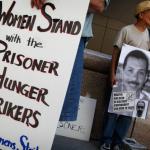California Prison Officials Say 30,000 Inmates Refuse Meals

California officials Monday said 30,000 inmates refused meals at the start of what could be the largest prison protest in state history.
Inmates in two-thirds of the state's 33 prisons, and at all four out-of-state private prisons, refused both breakfast and lunch on Monday, said corrections spokeswoman Terry Thornton. In addition, 2,300 prisoners failed to go to work or attend their prison classes, either refusing or in some cases saying they were sick.
The corrections department will not acknowledge a hunger strike until inmates have missed nine consecutive meals. Even so, Thornton said, Monday's numbers are far larger than those California saw two years earlier during a series of hunger strikes that drew international attention.
Despite the widespread work stoppages and meal refusals, Thornton said state prisons operated as usual through the day. "Everything has been running smoothly," she said. "It was normal. There were no incidents."
The protest, announced for months, is organized by a small group of inmates held in segregation at Pelican Bay State Prison near the Oregon border. Their list of demands, reiterated Monday, center on state policies that allow inmates to be held in isolation indefinitely, in some cases for decades, for ties to prison gangs.
Though prison officials contend those gang ties are validated, the state last year began releasing inmates from segregation who had no evidence of gang-related behavior. Nearly half of those reviewed have been returned to the general population.
The protest involves the same issues and many of the same inmates who led a series of protests in California prisons two years ago. At the height of those 2011 hunger strikes, more than 11,600 inmates at one point refused meals. The correction department's official tally, which counts only those inmates on any given day who have skipped nine consecutive meals, never rose above 6,600.
